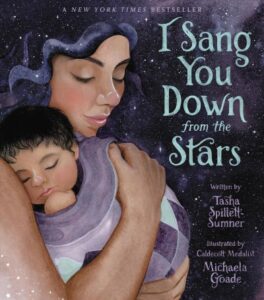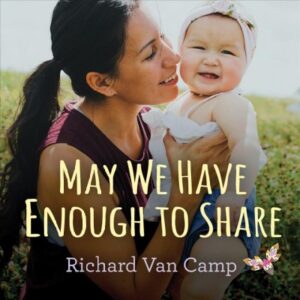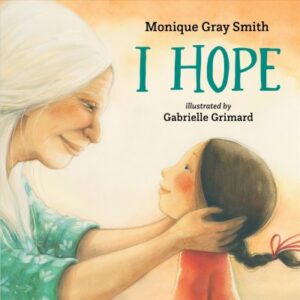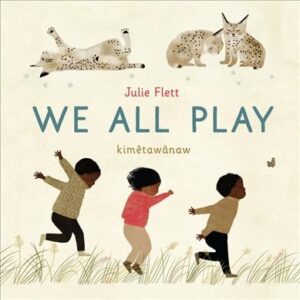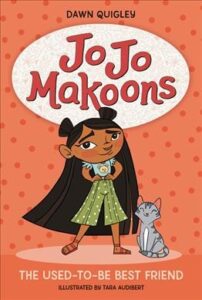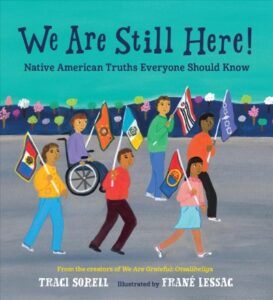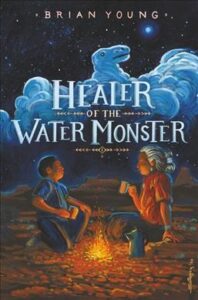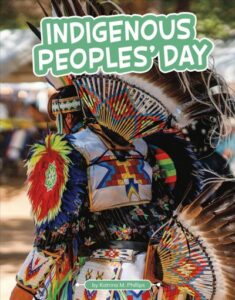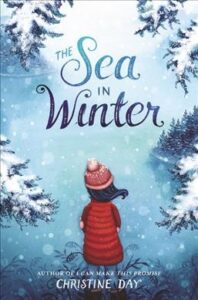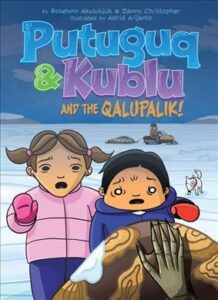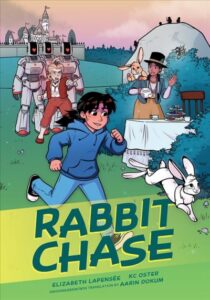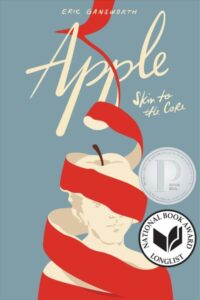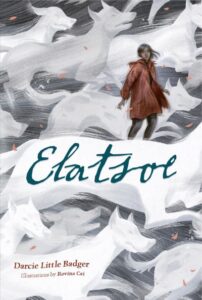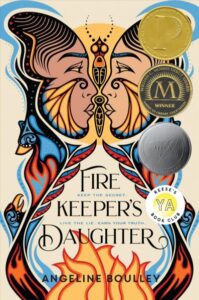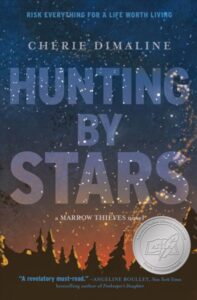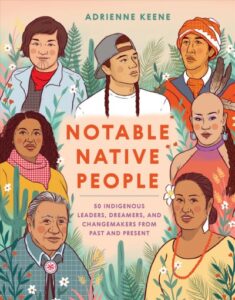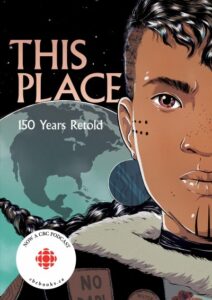November is officially recognized as Native American Heritage Month. The aim is to provide a platform for Native people in the United States of America to share their culture, traditions, crafts, and ways and concepts of life. It is not only a month to celebrate these cultures, but also to bring awareness to the concerns of Native people and encourage city/county/state officials to work towards understanding and taking action to find solutions.
Native-Land.ca
Use this map to learn about the various native peoples that have occupied and stewarded this land. You can find out more about the mission of the Native Land Digital project here.
These are the peoples that lived in Deerfield before colonization:
Each links to the Native Land’s page about the territory, which has various resources to learn about the past and present peoples of that nation or tribe.
Book Recommendations
Every year the American Indian Library Association announces its best books list and its Youth Literature Awards. Below are some of the recommended books from 2021 and 2022!
Be sure to visit the Library to check out our Native American Heritage Month display and grab a special bookmark!
Picture Books & Board Books
I Sang You Down From The Stars
written by Tasha Spillett-Summer; illustrated by Michaela Goade.
Juvenile Picture Book (E BABY SPILLETT-SUMNER)
A Native American woman describes how she loved her child before it was born and, throughout her pregnancy, gathered a bundle of gifts to welcome the newborn.
May We Have Enough to Share
Written by Richard Van Camp
Juvenile Baby Book (E BABY BOOKS OUR WORLD V)
A beautiful board book about gratitude by celebrated Indigenous author Richard Van Camp, complemented by photos from tea&bannock, a collective blog by Indigenous women photographers.
I Hope
Written by Monique Gray Smith
New Juvenile Picture Book (E GRAY SMITH)
This beautifully illustrated picture book, written by award-winning Indigenous author Monique Gray Smith, explores all the hopes adults have for the children in their lives
We All Play = Kimêtawânaw
Written by Julie Flett
Juvenile Picture Book (E FLETT)
Join celebrated artist Julie Flett on a joyful romp with animals. From chasing, chirping birds, to swimming, squirting whales, this book for young readers reminds them how animals play just like them.
Raven Squawk, Orca Squeak
Writte by Roy Henry Vickers and Robert Budd
Juvenile Baby Book (E BABY BOOKS NATURE V)
With bright and bold illustrations by celebrated Indigenous artist Roy Henry Vickers, this sturdy board book introduces iconic sounds of the West Coast and supports the language development of babies and toddlers.
Juvenile & Middle Grade Books
Jo Jo Makoons: The used-to-be best friend
written by Dawn Quigley; illustrated by Tara Audibert
Early Chapter Book (J QUIGLEY)
Even though Jo Jo loves her #1 best friend Mimi (who is a cat), she’s worried that she needs to figure out how to make more friends. Because Fern, her best friend at school, may not want to be friends anymore.
We Are Still Here!: Native American Truths Everyone Should Know
written byTraci Sorell ; illustrated by Frané Lessac
Juvenile Book Nonfiction (973.0497 SOR)
A group of Native American kids from different tribes presents twelve historical and contemporary time periods, struggles, and victories to their classmates, each ending with a powerful refrain: we are still here”
Healer of the Water Monster
written by Brian Young
Juvenile Fiction (J YOUNG)
One night, while lost in the nearby desert, Nathan finds someone extraordinary: a Holy Being from the Navajo Creation Story–a Water Monster–in need of help. Now Nathan must summon all his courage to save his new friend.
Indigenous Peoples’ Day
written by Katrina M. Phillips
Juvenile Book Nonfiction (394.264 PHI)
Indigenous Peoples’ Day is about celebrating! The second Monday in October is a day to honor Native American people, their histories, and cultures. People mark the day with food, dancing, and songs. Readers will discover how a shared holiday can have multiple traditions and be celebrated in all sorts of ways
The Sea in Winter
written by Christine Day
Juvenile Fiction (J DAY)
After an injury sidelines her dreams of becoming a ballet star, Maisie is not excited for her blended family’s midwinter road trip along the coast, near the Makah community where her mother grew up
Putuguq & Kublu and the Qalupalik!
written by Roselynn Akulukjuk and Danny Christopher; illustrated by Astrid Arijanto.
Juvenile Comic Book (J AKULUKJUK)
On their way to the shoreline, Putuguq and Kublu run into their grandfather, who has a stern warning for the pair: always beware when playing on the shore, because you never know if a qalupalik, a mythical creature that kidnaps children, is lying in wait under the ice.
Rabbit Chase
Written by Elizabeth La LaPensée
Juvenile Comic book (J LAPENSEE)
Anishinaabe culture and storytelling meet Alice in Wonderland in this coming-of-age graphic novel that explores Indigenous and gender issues through a fresh yet familiar looking glass.
Teen Books
Apple : Skin to the Core
written by Eric Gansworth
Teen Nonfiction (970.00497 GAN)
The term “Apple” is a slur in Native communities across the country. It’s for someone supposedly “red on the outside, white on the inside.” Eric Gansworth is telling his story in Apple (Skin to the Core). The story of his family, of Onondaga among Tuscaroras, of Native folks everywhere. From the horrible legacy of the government boarding schools, to a boy watching his siblings leave and return and leave again, to a young man fighting to be an artist who balances multiple worlds. Eric shatters that slur and reclaims it in verse and prose and imagery that truly lives up to the word heartbreaking
Elatsoe
written by Darcie Little Badger; illustrations by Rovina Cai
Teen Fiction (LITTLE BADGER, D.)
Seventeen-year-old Elatsoe (“Ellie” for short) lives in this slightly stranger America. She can raise the ghosts of dead animals, a skill passed down through generations of her Lipan Apache family. Her beloved cousin has just been murdered, in a town that wants no prying eyes. But she is going to do more than pry. The picture-perfect façade of Willowbee masks gruesome secrets, and she will rely on her wits, skills, and friends to tear off the mask and protect her family
Firekeeper’s daughter
written by Angeline Boulley
Teen Fiction (BOULLEY, A.)
Daunis, who is part Ojibwe, defers attending the University of Michigan to care for her mother and reluctantly becomes involved in the investigation of a series of drug-related deaths.
Hunting by stars : a Marrow thieves novel
written by Cherie Dimaline
Teen Fiction (DIMALINE, C.)
Sequel to: The marrow thieves.
French has been captured by the Recruiters, confined to one of the infamous residential schools, where the government extracts the marrow of Indigenous people in order to steal the ability to dream, and where the captured are programmed to betray others of their kind, something which he discovers has been done to his brother; meanwhile the other survivors, his found family, are hunting for him, determined to rescue him
Notable Native People : 50 indigenous leaders, dreamers, and changemakers from past and present
written by Adrienne Keene; illustrations by Ciara Sana
Adult Nonfiction (920.009297 KEE)
An accessible and educational illustrated book profiling 50 notable American Indian, Alaska Native, and Native Hawaiian people, from NBA star Kyrie Irving of the Standing Rock Lakota to Wilma Mankiller, the first female principal chief of the Cherokee Nation. Celebrate the lives, stories, and contributions of Indigenous artists, activists, scientists, athletes, and other changemakers in this illustrated collection.
This Place: 150 Years Retold
Foreword by Alicia Elliott ; stories by Kateri Akiwenzie-Damm [and 10 others] ; illustrations and colours by Tara Audibert [and 10 others]
Teen Graphic Novel (THIS)
This collection of 10 stories retells Canada’s history since Confederacy in 1867 through the lens of its Indigenous peoples. Each story focuses on a significant Indigenous historical figure or event, illuminating pivotal moments with a focus on Indigenous rights and sovereignty. Eleven Indigenous authors and eight illustrators from various cultures make for a wide range of storytelling and illustrative styles


